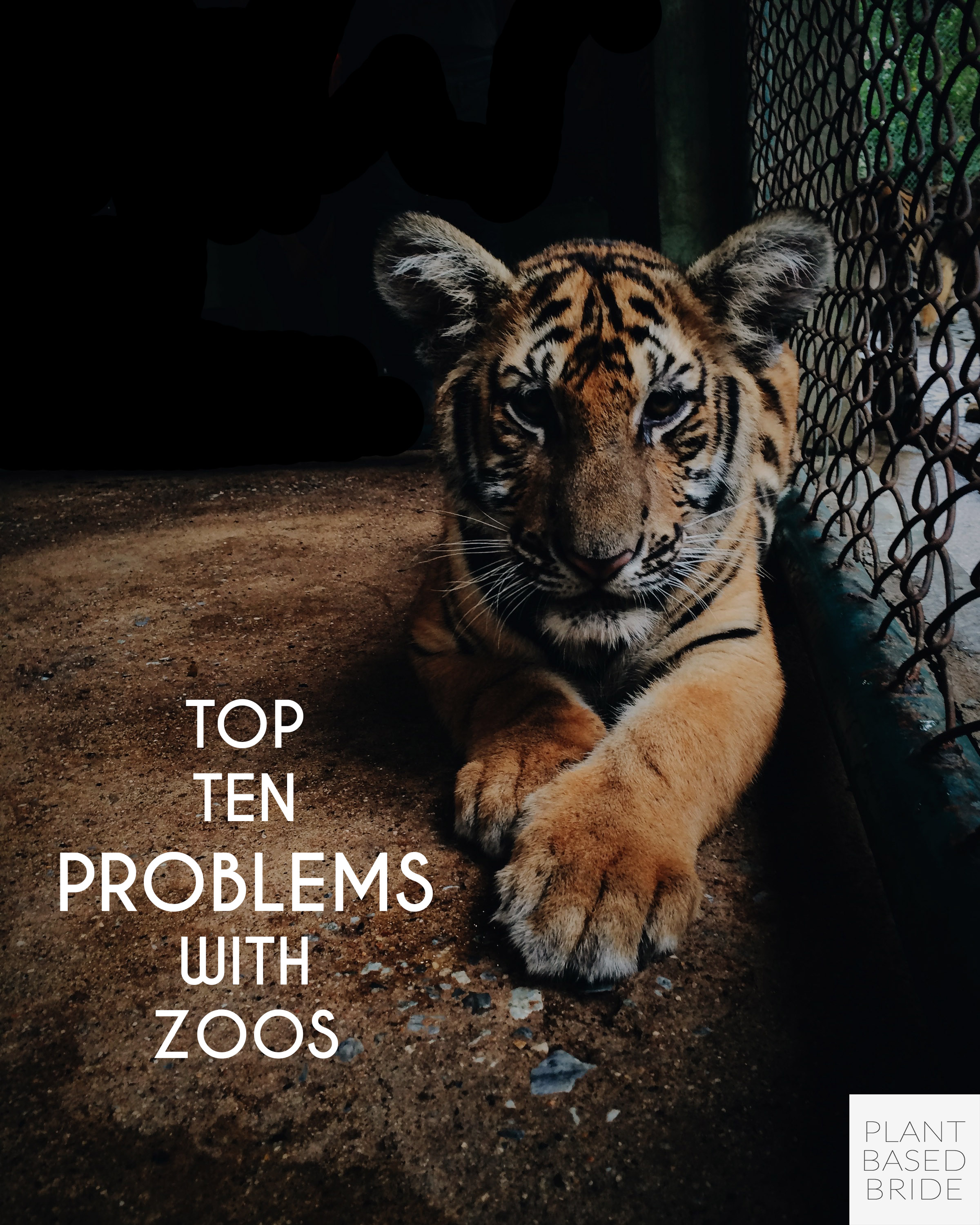Top Ten Problems With Zoos
I understand the appeal... a day out with the family, road trip, sunshine, adorable baby animals from exotic lands...
But zoos aren't all they're cracked up to be.
The recent documentary film Blackfish has brought the whole world's critical attention to SeaWorld, and further, to zoos in general.
And yet, somehow, zoos and other establishments capitalizing on the lives of animals for human entertainment around the world are still in business.
Stick around for ten sobering problems with zoos. Hopefully you'll be convinced that your hard-earned money is far better spent supporting conservation efforts for animals in the wild and buying vegan food for your family than taking this particular type of day trip.
ONE... Life in Captivity
These animals are imprisoned, no ifs, ands, or buts about it. Ever notice the bars and glass preventing animals from leaving their pens? Zoos are not a resort for exotic animals, zoos are a jail. If you think for one moment that these animals prefer to live in a cage over their vast natural habitat, you are sorely mistaken.
TWO... Man's Best Friend
Dogs and cats? Sure. Lions and tigers? I don't think so. The exotic animals held in zoos are not domesticated. They are wild, just as they should be. They could no more live with you in your one bedroom downtown apartment than you could survive on the Savannah without air conditioning and your macbook. Wild animals should not be in such close and constant contact with humans.
Why not?
Because the more time they spend with us, in our 'care', the less able of living on their own in their natural habitat they become. They become dependent on us.
Not only are we imprisoning them, but we're taking away their ability to survive if we ever tried to correct our mistakes and set them free.
THREE... The Pursuit of Happiness
I don't know if you've ever noticed, but animals in zoos don't look very happy. Would you be, sentenced to life in prison when you had done nothing wrong? I think not.
Some argue that there is no way to confirm or deny an animal's sadness. Well I beg to differ. We can see their unhappiness in their eyes. And if that's too 'spiritual' for you, why not look at the plain facts?
Animals in captivity exhibit unnatural behaviours such as apathy, aggression, and stalled maturation (prolonged infantile behaviour). They also carry out a wide spectrum of stress behaviours, ranging from pacing to self-mutilation and beyond. These are not behaviours noted in the wild.
Abnormal repetitive behaviour is a term used to describe these stress behaviours, anything from pacing back and forth or circling, rocking from side to side, head bobbing or weaving, continuous licking or biting of walls and bars, overgrooming and self-mutilation, vomiting, and eating feces. For video examples of these behaviours, click here.
You don't need to be an expert to see that those animals are NOT happy.
FOUR... Profit Over Conservation
Contrary to popular belief, a zoos' main purpose is not conservation. It's profit.
Need proof?
The Toronto Zoo lists seven endangered species which they are attempting to breed in captivity and reintroduce to the wild on their website . That's seven out of more than 460 species found at the zoo, or just 1.5%.
And the profits? Just some simple math considering their over 100,000 person attendance in March 2013 and the cost of a ticket ($23 for an adult, $14 for a child), even assuming equal numbers of both, the zoo would be bringing in 1.85 million dollars in a single month, without considering the generous donations they undoubtably receive.
Something seems off with this equation, and I don't think it's my calculator.
Oh, and another tidbit, just for fun. The Toronto Zoo clearly states on their lion information page that "Lions are losing their habitat due to the expansion of human activity (primarily agriculture)..." and yet they serve the results of animal agriculture to the masses of visitors flooding through their gates each and every day.
Conservation is clearly the priority here.
FIVE... Lifespan
Many claim that animals live longer in captivity, but this may not be quite as accurate as they would hope. While some individuals may live longer due to lack of predators and competition for food; stress, obesity, and other factors lead to the early death of many zoo animals.
One study found a difference of almost 40 years between elephants in captivity (living an average of 16.9 years) and those in the wild (an average of 56 years).
Orcas? Their lifespan is cut by as much as 87 years (from a lifespan of up to 100 years for females in the wild to an average lifespan of 13 years at SeaWorld).
Perhaps they would be better off in their natural habitat?
SIX... Victim Blaming is NOT the Answer
The solution to hunting and poaching is not to displace the animals, but the hunters and poachers. Why should the victims be further punished?
Of course hunting and poaching are immoral behaviours and the animals must be protected. But we need to imprison the abusers, not the abused.
SEVEN... What's 'Natural' Anyway?
Definitely not the tiny enclosures with painted backgrounds in zoos all over the world. These pens are not these animals' natural habitat, nowhere close. Who could ever think that a 5.8 million gallon pool at SeaWorld is equivalent to the over 350 quintillion gallons of water in the world's oceans? Or a 10,000 by 10,000 meter enclosure sufficient when wild African elephants walk more than 50 miles (more than 80,000 meters) per day?
Zoos are poor imitations of the many incredible ecosystems on Earth, and a poor substitute for a home.
EIGHT... The Birds and the Bees
Zoos are known for their breeding programs, both because they tout them proudly as conservation efforts for endangered species, and because they produce the cute cuddly baby animals we all love to gawk at.
As a statement from SeaWorld so eloquently put it: "Breeding is a natural, fundamental and important part of an animal's life and depriving a social animal of the right to reproduce is inhumane."
Because keeping Orcas in tiny pools and forcing them to do tricks in front of thousands of screaming people is a natural, fundamental and important part of an animal's life, and social animals love to have no choice whatsoever in whether or not they reproduce, and with whom.
Right.
What happens when one too many cute baby animals have been bred and there's not enough space to keep them? There are two options: kill them (after which point they may be fed to other captive animals) or sell them.
Who would buy surplus zoo animals? Other zoos, exotic animal dealers, ranches, circuses, pet shops, research centres, and the exotic meat industry.
And the zoo pockets the cash.
NINE... A Life Full of Purpose
Quiz time! Where do you think a lioness is most able to fulfill her life's purpose: on the African savannah with her 7 or so fellow adult pride members and cubs, contending with other predators, hunting for food, and protecting her young OR being forced into association with other lions, fed at regular intervals, selectively bred, and kept in a small enclosure free from other species or any true semblance to her natural habitat?
I think the answer is pretty clear.
TEN... Which E Is It?
Everyone loves to bring up the point that zoos are educational.
I'd argue that zoos are far more entertainment than education.
I can learn much more over the course of 15 minutes on the internet than I can watching animals suffering from zoochosis in an unnatural habitat for those same 15.
Perhaps families should commit more time to the watching of documentaries and reading of books rather than contributing to the unnecessary and cruel exploitation of animals.
They've done nothing to deserve it.
Well, there you have it, ten of the most poignant problems with zoos. I, for one, will never again attend a zoo, circus, or other area of captivity for non-domesticated animals.
What are your thoughts on zoos? Start a conversation in the comments!
Until next time,
Don't forget to subscribe to the Plant Based Bride newsletter below the comment section! Get first dibs on freebies, news, and other fun stuff and be in direct contact with yours truly.
(You know you want to.)
Sources & Further Reading
http://www.all-creatures.org/articles/ar-zoos.html
http://www.veganpeace.com/animal_cruelty/zoos.htm
http://www.peta.org/living/entertainment/reality-zoos/
http://www.bornfree.org.uk/campaigns/zoo-check/captive-wildlife-issues/abnormal-behaviours/
http://www.onegreenplanet.org/animalsandnature/the-life-of-animals-in-captivity-versus-the-wild/
http://www.onegreenplanet.org/animalsandnature/the-life-of-animals-in-captivity-versus-the-wild/
http://www.cnn.com/2015/10/08/us/seaworld-orca-tank-expansion-plan-hearing/
http://www.seaworldofhurt.com/features/8-reasons-orcas-dont-belong-seaworld/
http://www.thestar.com/news/gta/2010/01/13/tusk_tusk_toronto_is_on_worst_zoo_list.html
http://oceanservice.noaa.gov/facts/oceanwater.html
http://www.onegreenplanet.org/news/zoochosis-what-really-happens-to-animals-in-captivity-video/






























